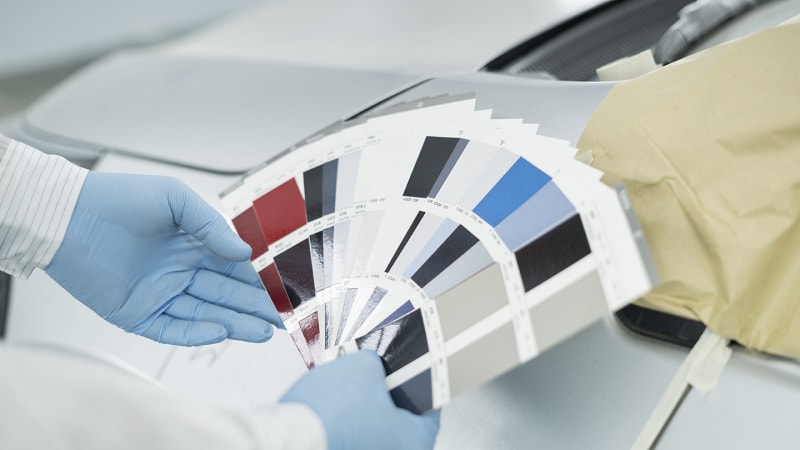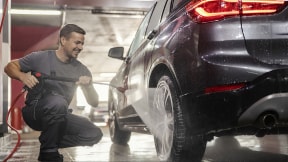How much does it cost to paint a car?

Quick insights
- Painting a car involves various factors that can influence the cost.
- Different types of paint jobs offer varying levels of durability and finish quality.
- Knowing when to paint your car and exploring alternative options can help you manage the costs.
Giving your car a new paint job is like giving it a facelift. It can enhance the vehicle's look, increase its resale value and protect it from environmental elements. Before you get started, it can be helpful to understand the costs, types of paint jobs and other considerations involved.
Average cost of a paint job
The cost of painting a car can vary widely, typically ranging from $500 for a basic job to over $5,000 for high-quality, professional work. Factors influencing the cost include the size of the vehicle, the type of paint used, the complexity of the paint job and the reputation and location of the shop. A little front-end research can go a long way toward determining the right option for your interests and budget.
Cost considerations when painting your car
When considering the cost of painting your car, it's important to plan for and factor in relevant expenses. These may include the following:
- Paint: The cost of the paint itself can vary significantly based on the quality, color and type of paint you choose. High-quality, specialty paints can cost several hundred dollars per gallon.
- Prep: Preparing the car for a new paint job can involve repairing dents, removing rust and sanding the surface. This can be labor-intensive and may add to the overall cost.
- Labor: If you're hiring a professional to paint your car, labor costs can be a significant part of the expense. Rates can vary based on the complexity of the job and the reputation of the shop.
- Other expenses: Additional costs can include items like primer, clear coat and supplies like sandpaper and masking tape. If any parts of the car need to be removed or masked off during painting, this can also add to the labor cost.
There is more to consider when planning a paint job than just the upfront cost of the paint itself. One of the most important considerations is how the effort and expense will impact the vehicle's resale value.
It's also worth considering the cost of not painting your car if it has significant cosmetic damage or rust, as this could lead to more costly repairs down the line. Rust is detrimental to a car's value because it can compromise the structural integrity of the vehicle. Rust can eat away at the car's metal components, leading to parts failure and safety risks far beyond the cosmetic issues.
Types of car paint jobs
When it comes to painting your car, not all paint jobs are created equal. Different types of paint jobs offer varying levels of durability, finish quality and cost, so it's helpful to understand your options. We’ll break the options down into three primary categories below:
- Basic: A basic paint job typically involves a single-stage enamel paint that gives a glossy finish without a clear coat. This is the most affordable option and can be done as a do-it-yourself (DIY) project, though it may not be as durable or flawless as higher-end jobs.
- Standard: A standard paint job usually includes urethane paint, which provides a good balance of price, durability and appearance. This base is often followed by a clear coat for added gloss and protection. As a result, this is the middle option in terms of both cost and complexity.
- Premium: Premium paint jobs use high-quality paints and multiple layers, including primer, base coat and clear coat. They offer the best durability and finish but are also the most expensive and complicated to complete.
When to paint your car
Let’s not get ahead of ourselves; before determining the cost to paint your car, first consider when and if a paint job is even necessary.
Deciding when to paint your car can depend on several factors. If your car's paint is faded, chipped or rusted, a new paint job can help protect the body and improve its appearance. If you're planning to sell your car, a fresh paint job could increase its appeal to potential buyers.
That said, if the car is relatively new and the paint is in good condition, it may be more cost-effective to maintain the existing paint through regular washing and waxing. As a general rule, if there is little or no noticeable damage to the paint, there may be better uses for your money than a whole paint job.
Professional vs. DIY car painting
Whether you opt to paint your car yourself or hire a professional, it’s important to weigh the cost vs. quality ahead of time. A low-cost job might save a little money in the long run, but a poor paint job could actually end up decreasing the value of your vehicle.
Alternatives to painting your car
If a full paint job isn't in your budget or doesn't seem necessary, there are several alternatives to consider:
- Touch-up paint: For small chips and scratches, touch-up paint can be a cost-effective solution. It's a quick fix that can easily blend with your car's existing paint, potentially hiding minor damage. However, you should find a touch-up paint that matches your car's color exactly, as even a slight difference can be noticeable.
- Vinyl wraps: Vinyl wraps offer a way to change your car's appearance without painting. They come in a wide array of colors and finishes and may include graphics or advertising. They can generally be removed without damaging the original paint, making them a reversible option if you want to change the look of your car or return it to its original color.
- Paintless dent repair: If your car has dents but the paint is intact, paintless dent repair can be a cost-effective way to improve your car's appearance without repainting. This technique uses special tools to manipulate and smooth the metal back to its original shape, preserving the original paint.
- Car detailing: A professional car detailing service can restore the shine to your car's existing paint job, improving its appearance without the need for repainting. Detailing can remove minor scratches, restore color and add a protective layer to your car's paint.
- Clear paint protectors: Also known as clear bras or paint protection film, these protectors are applied to the front of the car to protect the paint from chips and scratches. They are virtually invisible and can protect the car's original paint job without altering its appearance.
The bottom line
Painting your car is an investment that can protect your vehicle, enhance its appearance and potentially increase its resale value. By understanding the costs involved, the types of paint jobs available and when it's worth painting your car, you can make an informed decision that suits your needs and budget. Whether you opt for a full paint job or explore alternatives, maintaining your car's exterior is an important part of vehicle ownership.



